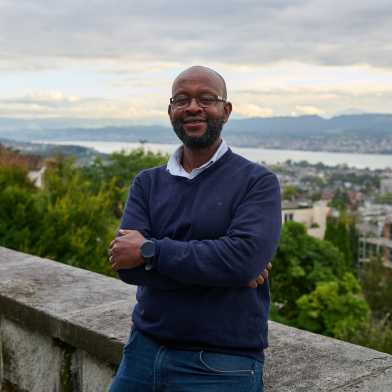Data and information
Our society has been permeated by digitalisation, social networks, artificial intelligence and other IT-based innovations. The consequences of these disruptions are fundamental in nature and closely linked to technological developments.

Data and Information comprises the following topics:
- collecting data (digitalisation and sensing)
- communicating data (wireless and wired networks)
- processing data (storing, organizing, computing)
- algorithms (data science, artificial intelligence, machine learning, statistics)
- visualization and human interaction
It has fundamental and long-term influence on all areas of science. New models and methods impact the way we do research and teach in all departments including Architecture, Engineering, Natural Sciences and Mathematics, Management and Social Sciences.
Data science
ETH Zurich wants to create more capacity in data science while strengthening the connection between the core subjects of computer science, mathematics, electrical engineering and information technology, and all other disciplines represented at ETH. The tension between the broad interest in data and the right to privacy has given risen to new interdisciplinary research topics that go beyond technical issues and require close cooperation with the social sciences and humanities.
Working together with Swiss and international partners, ETH Zurich will continue to engage in important collaborative research. Moreover, ETH educates computer scientists, giving them profound expertise and fostering their critical thinking skills when it comes to digital technologies. Further, the interaction and the dialogue with society about the implications and the consequences of progress in this field is of importance to ETH Zurich.
Quantum technology
Quantum technology is revolutionising the methodology of how specific numerical problems are solved, how data is transferred, and how tiny signals can be measured. New findings in quantum physics allows tackling problems that were previously difficult to solve and to revamp how data transfers are safeguarded. ETH Zurich has been at the forefront of shaping quantum information science and quantum technology since the advent of these fields.
ETH Zurich’s objectives, measures and initiatives for the strategic action area Data and Information can be found in the Strategy and Development Plan 2021-2024.
Collaborations and Centers of Excellence
external page Swiss Data Science Center together with EPFL
The external page Center for Learning Systems is a joint research centre of ETH Zurich and the Max Planck Society and is dedicated to machine learning.
The ETH AI Center will promote interdisciplinary collaboration and drive the adoption of new AI developments in the natural sciences, health sciences, environmental sciences and robotics.
external page National Centre of Competence in Research – NCCR Automation – is being created to fortify our research and education activities in the fields of cyber-physical systems, the Internet of Things, autonomous mobility and machine learning.
Zurich Information Security & Privacy Center (ZISC)
News on data science
“Big Tech is not the problem”

Professor Ciira wa Maina is the Chair of Data Science Africa, a founding member of the International Computation and AI Network (ICAIN), an initiative to democratise artificial intelligence (AI). In an interview with ETH News, he explains how AI can help African farmers and why Europe benefits from cooperation.
From weakest link to security factor

Verena Zimmermann is convinced that it is too simplistic to view people solely as a risk factor in cyber security. Rather, the special abilities of users should be utilised in a targeted way in order to increase cyber security.
And it keeps on turning

The coloured Cube has been around for 50 years. Its inventor, Ernő Rubik, celebrated his 80th birthday this year. At the invitation of the ETH Department of Mathematics, he spent some time in Zurich to discuss the fascination of the Rubik’s Cube with researchers, students and children.